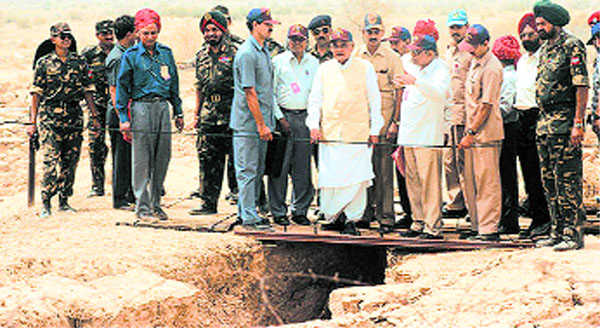
Prime Minister Vajpayee at the nuclear blast site in Pokharan in 1998. file photo
If recognition of achievement, like justice, is for some reason delayed, it is also justice denied. On Friday, when President Pranab Mukherjee conferred the Bharat Ratna on former Prime Minister Atal Bihari Vajpayee at a special ceremony at his house, the feeling was that it was a tad too late. Now 90 years old and ailing, Vajpayee could barely acknowledge the signal honour. Rather than an NDA government led by Narendra Modi, he perhaps would have appreciated it more if the UPA government headed by Manmohan Singh had conferred him the award during its tenure. For, across the political spectrum, there is no doubt that he is a great son of India.
Vajpayee’s contribution was immense and there is much that he is remembered for — being the first non-Congress Prime Minister to serve a full term, a brilliant orator who raised the quality of national debate, a moderating influence over Sangh Parivar hotheads, as PM ushering both political stability and sustained economic growth, taking the bold decision to conduct the 1998 nuclear tests, thwarting Pakistan’s aggression in Kargil and guiding the nation pragmatically through turbulent international waters.
There is much that Vajpayee may regret — that he did not take firm action against the Gujarat government after the 2002 riots and that he was betrayed by Pakistan in 1999 after he extended a hand of peace by undertaking a symbolic bus journey to Lahore, which in retrospect was dubbed as naive. But the plusses far outnumber the minuses and Vajpayee finds a place among the pantheon of tall leaders that ruled independent India.
Vajpayee’s personality is a study in contrast — a rare combination of being the hard and the soft. His love for the arts, particularly poetry, is well known. His own verses reflect a touching tenderness. On one occasion, he wrote a poem pleading for peace between Pakistan and India saying, “Pyar karen ya vaar karen, Khoon ek behena hai, Jo humpar guzri hai, Bachon ke sung na hone denge (Whether we are friends or at war, it is the same blood that flows, what has befallen us, we won’t let it happen to our children).”
Yet, he did not hesitate to take the decision to go ahead with the 1998 nuclear explosions and declare India as a nuclear weapons state. For me, the defining moment of his prime ministership were the tests. He was generous enough to allow me to quiz him for my book on the subject. Among the questions I asked him was that as a leader searching for peace among nations, what were the inner conflicts he had to overcome to go ahead with nuclear tests knowing that it would put him on the path of confrontation with India’s neighbours and a host of powerful nations? Did he feel somewhat as Arjuna did when he stood ready to battle his relatives in Mahabharat? Vajpayee was silent for a while and then, with characteristic brevity, told me, “There was no need for much thought. We just had to do it.”
Vajpayee had a knack of rapidly stripping the mountain of arguments to its core. The simplicity and directness of his thinking came through in his answers. He was convinced that for India to regain its greatness, it must have military might. As he told me, “We have to be self-reliant in defence. We just can’t depend on others to come to our rescue.” I asked him what he felt when he first heard the news that the nuclear tests had been successful and he confessed: “It is difficult to describe the moment but I felt a sense of fulfillment and joy.”
It was fulfilling for Vajpayee because he had been advocating that India become a nuclear power since the 1960s. Soon after the 1998 tests, Vajpayee declared, “We do not want to cover our action with a needless veil of ambiguity. India is now a nuclear weapons state. But our intentions were, are and will always be peaceful.” After Pakistan retorted by conducting six nuclear tests, he privately told Sudheendra Kulkarni, his close aide: “Now that we have demonstrated that we both have nuclear weapons, we can’t afford to go to war. We will come closer to each other and it will open the road to co-operation.”
Vajpayee would be both right and terribly wrong. A year later, he held the historic summit with Nawaz Sharif at Lahore which outlined a new road to peace. However, months later, his trust was betrayed when Pakistan began the Kargil intrusions that led to a brief border war between the two countries. India succeeded in winning the war but it left Vajpayee deeply saddened. Kulkarni feels, “More than being remembered as someone who made India nuclear strong, Vajpayee wanted to be known as the leader who brought peace with India’s neighbours, particularly Pakistan.” Vajpayee though did make India a wiser, stronger and yet gentler nation and richly deserves the nation’s highest honour.



























